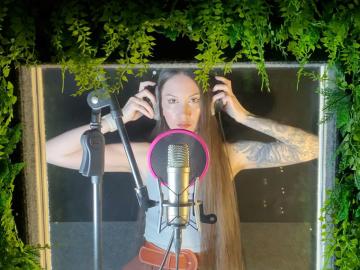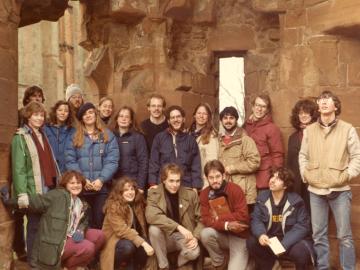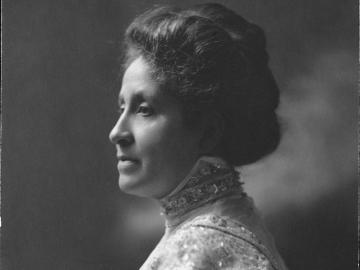Oberlin Alumni Magazine
The Long and Winding (Entrepreneurial) Road
June 13, 2024
Annie Zaleski

It’s been more than two decades, but Evelyne White ’04 still remembers exactly how she discovered the Ashby Business Scholars program. As she walked into Stevenson, she saw a paper sign for the then-new program and ripped off a tab with contact info that directed her to learn more.
White ended up becoming part of the first Ashby Business Scholars cohort—a transformative experience that had an enduring impact on her life and career. After working in private equity and earning an MBA from Harvard Business School, White caught the entrepreneurial bug and today is the CEO and co-founder of SixPlus, a startup company that makes it easy for businesses and marketing professionals to source and book private event spaces.
A harpist who graduated from the Interlochen Arts Academy, White lived in Harkness Hall—she was the cleanliness coordinator—and worked at the Feve as a baker and Stevenson Dining Hall as a student manager. Below, she shares how her time at Oberlin (and the Ashby Business Scholars) and the people she met along the way have shaped her career.
At Oberlin, I had figured out that what mattered most was seeking out people who inspired me. For example, I walked into Paul Dawson's American Government 101 class and my jaw dropped. I wanted to go to every class that he taught.
I started off as a double degree major. I was considering a career in music, but I had other interests—namely, environmental studies. I ended up being a politics major. I interned on Capitol Hill with a Congressman and at the Environmental Law Institute. It seemed like I was Washington, D.C.-bound.
But I was really open. I walked into Stevenson and saw a paper sign about this new program, Oberlin Business Scholars, happening during Winter Term. And I ripped off a tab with information on how to apply and learn more.
I remember that whole period so vividly: buying my first suit, the photo we took, having to get professional for these interviews. [Laughs.] It was a first in so many ways. And then the program itself was unbelievable. We visited so many alumni and every single person I met exposed me to some career I had no idea existed. It was like, “Wow, you can do this with your life?”
Chris Wofford ’87, who was working at Bear Stearns at the time, gave this inspiring talk. And I just said, “I want to do this. I really want to work for this guy.” We were walking toward the next visit, and I broke the rules: I snuck into an internet café for long enough to email Chris my résumé. I wanted him to know, “I just left you—and five minutes later, you've got my résumé. I'm really interested.” I ended up getting a job at Bear Stearns—my first job.
I was also the spokesperson for the Ashby Scholars class. At the end of the program, I got up and spoke and thanked the sponsors of the program, Béla Szigethy '77 and Stewart Kohl '77. Stewart came up to me afterwards, introduced himself, and said, “You know, if you ever want to work in private equity, let's stay in touch.” He said something very complimentary. It left a lasting impression on me.
I kept up with him. And after my two years at Bear Stearns, I ended up going to Riverside Company and working for Béla and Stewart, who were very smart, very connected to people, and cared about them. If you can find a boss who nurtures you and others, where else would you want to be?
I went back to Riverside after going to Harvard, but I decided three years in that I wanted to explore this entrepreneurial bug I had. At the time, I was working in Brussels, Belgium, and was an Airbnb host. I saw that the tourists who were renting or staying with me all wanted a local experience. They wanted someone who lived there, and preferably spoke their language, who could just tell them, “Oh, this is what you want to see.” I had this vision that every Airbnb guest would start off their first or second night in a town booking a local. And then they'd figure out what to do for the rest of their stay.
So I left Riverside to start BookaLokal. I went in with my hands shaking to my boss's office, and I said, “You know, this is probably the craziest thing I've ever done, but I really want to do this thing.” I gave my notice. Béla and Stewart were among my first investors, and they've been huge supporters.
I spent a few years building the platform and building out hosts. We had hosts in 47 countries. We had tens of thousands of users going to dinners and lunches and drinks, food tours, barbecues in people's homes. I met some of my closest friends through that time. And every time I'd host a dinner, someone would inevitably say, “Oh, I want to be a host.” That was validating to me in the early days that we could organically grow this marketplace.
Fast forward two years. It was very clear that though that was fun, it was not a problem that was being solved. Everybody who heard the idea loved it. But people didn't need to do it. Or someone who really wants to use the site would get to Paris, and there might not be any hosts available in the neighborhood they needed, on the night they needed. There were so many logistics to work out. It didn't turn out to be the right business.
But in this same process of working on BookaLokal, I realized there was a need for private events. If you get 10 people for someone's birthday, or 10 people for a corporate team building event, that works. So we started selling private events at the houses of our top hosts.
One day, a client booked an event in a brownstone in New York for a group of executives coming in from Europe. But then she read the fine print and noticed there was a cat on premises. She called me in a panic and said, “The host of this event is definitely allergic to cats. We can't do it there.”
I ran around my neighborhood, went to restaurants and found this place called Beecher’s Cheese, which is now closed. But they had a private room overlooking their cheese factory. I asked, “Can you put together a really unique experience, like a tasting event?” And they could, so we switched to this place.
And that was how SixPlus was born. I realized there are all of these private rooms and restaurants that are actually more underutilized than people's homes. We kept the same team and same investors, but spent six months building the new platform and then launched it.
What you do as a startup founder and CEO varies so much. When you first start the company, it's just you, unless you have a co-founder. I had one—they were the technology person—so I did everything except build the platform. And then as you grow the team, you're basically looking at, “Where's the biggest need?” You think about the team and the skill sets you need. I do a lot of fundraising; right now, we're doing that. I also do client development, talking to them and showing them how to use the platform.
A founder will do a lot of the HR functions of a company until you get to a certain size. And as I grew the team, I hired to fill specific roles. At the beginning I was trying to match clients and venues, so one of the key hires I made was in venue partnerships. She put a process in place for marketing to venues, and then there's somebody else that onboards them and makes sure their partnership with us is successful. Firing as well is part of my job. Sometimes things don't work out or your business may contract, and you need to let people go.
We had three years of great growth and going into new markets. We started in New York, and then went to Boston, D.C., and San Francisco, and were in the midst of launching Los Angeles and Chicago when things came to a halt due to the pandemic. I had to lay off 90 percent of the team and shut five offices by myself. I went into what I call active hibernation, because there was nothing we could do. We tried a lot of things to stay in touch with our customer base, but there was nothing substantial happening.
As a founder, you basically steer the ship wherever the ship’s going—or you try to point it in the direction you want to. Sometimes the wind is just beating down the other way, and there’s nothing you can do about it. But it looks like 2024 is going to be a good year.
A version of this story originally appeared in the Winter/Spring 2024 issue of the Oberlin Alumni Magazine.
Tags:
You may also like…
Voices Carry
March 13, 2025
Grammy-certified vocalist and viola da gamba player Ari Mason ’14 finds her niche in video games, films, and a vocal library.
London Calling
March 13, 2025
For Tracy Chevalier ’84, the Oberlin-In-London program was a magical, intense period of cultural and intellectual stimulation. As the beloved study-away experience celebrates 50 years, the New York Times best-selling author looks back on the semester she spent studying and living in London.
A Banner Held High
February 26, 2025
In 2018, Oberlin College named its main library after civil rights leader Mary Church Terrell, Class of 1884.


